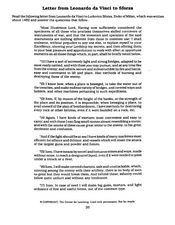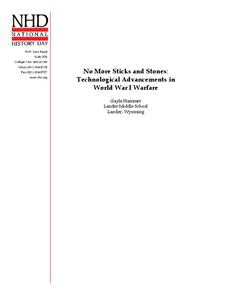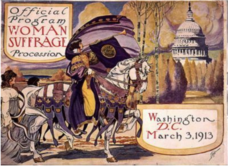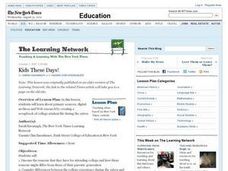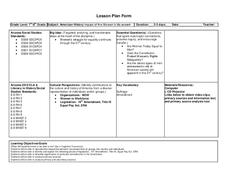Curated OER
The Underground Railroad
High schoolers write about the impact of the Underground Railroad. They examine primary documents as they conduct independent research to explore the role of the Underground Railroad during the fight for abolition. They...
Curated OER
The Evolution of the Preamble
Reading and comprehending informational text is vital in all subject areas. Upper graders use primary sources and worksheets to better comprehend the historical importance of the Preamble of the US Constitution. Web links, handouts, and...
Curated OER
Expanding the Story of the Montgomery Bus Boycott
Introduce the class to the Civil Rights Movement by taking a critical look at the Montgomery Bus Boycott in 1955. They will pay close attention to the role women played in organizing the boycott and bringing national attention to the...
Curated OER
Letter from Leonardo da Vinci to Sforza
Expose your class to words directly from Leonardo da Vinci with this primary source document. Learners analyze the document, a letter from Leonardo da Vinci to Ludovico Sforza, the Duke of Milan, and respond to 3 short answer questions....
National History Day
No More Sticks and Stones: Technological Advancements in World War I Warfare
Remind young historians that many technological advancements influenced the events of World War I. After analyzing technology's evolution through primary sources, discussing the changes over time, and watching various video clips,...
Skyscraper Museum
Building a Skyscraper
The construction of skyscrapers is no simple undertaking, involving the careful coordination and planning of many different people. The third lesson in this series explores this detailed process by first teaching children about the main...
National Woman's History Museum
Feminist Philosophers of the 20th Century
Reclaim forgotten philosophers of the twentieth century. Feminist philosophers have shaped our current concepts of politics and gender, but they are seldom mentioned in the classroom. Change that omission with a lesson plan that includes...
Digital Public Library of America
Their Eyes Were Watching God by Zora Neale Hurston
Zora Neale Hurston's novel Their eyes Were Watching God has been highly praised and severely criticized for its depiction of African American folk culture. A set of primary source materials, including photographs, articles, essays, and...
Curated OER
The Women’s Suffrage Movement
A set of lessons about the women's suffrage movement will bring history to life for your middle schoolers. Learners study primary documents, learn about famous suffragettes, and compare the suffrage movement to current events...
Curated OER
The Impact of the Civil Rights Movement
Deepen understanding of the Civil Rights Movement with this collection of primary documents. This resource contains 22 video transcripts about desegregation, voting rights, black power, Dr. Martin Luther King Jr., and more. You might...
National Endowment for the Humanities
A Debate Against Slavery
Slavery is a serious topic that can be challenging for middle schoolers to study. Young scholars can see firsthand through primary sources what occurred during that time period in the United States. The third of five lessons provides...
Curated OER
Kids These Days!
Students create a scrapbook of college student life during the 1960's using digital archives and Internet research. They read and discuss the article "What's the Matter With College?" and then compare college experience of today with...
Curated OER
Liberty for All: Voices from the Revolution
Did the Declaration of Independence really intend to grant liberty for all? Get your class thinking about historical perspective with documents relaying the experiences of women, white men, and African-Americans during the Revolutionary...
University of Chicago
Using Artifacts for Clues About Identity
Learn about the ancient Near East through a close examination of ancient artifacts. Lead your class into analysis by first observing an artifact as a class. Pupils can then work in pairs to analyze the other artifacts and compile a list...
Curated OER
What Can We Learn From the Past?
What would future archeologists learn from your scholars' personal belongings? Have them bring in a box of "primary sources" from their home. Discuss the difference between observations and inference, using some of your own items to...
National Park Service
Should America Have Gone to War in 1812?
Using an incredibly engaging activity and detailed lesson plan, your learners will serve as advisors to President Madison on whether to participate in what would become the War of 1812! Utilize a variety of effective instructional...
Library of Congress
Marco Paul's Travels on the Erie Canal: An Educational Voyage
Following the book, Marco Paul's Travels on the Erie Canal, readers complete an activity for each chapter, take part in discussions, and respond to several questions. To show what they know, scholars create an alphabet book using primary...
Arizona Department of Education
American History Impact of the Women’s Movement
Take a look at important images that depict the women's suffrage movement, the support for the Equal Rights Amendment, and wage equity for women over the last two centuries. As class members work through a lesson on...
Curated OER
Differing Federal Responses to the Great Depression: Letter Analysis
Young analysts examine two letters, one written by President Hoover and one written by FDR. Each letter contains that president's response to the role of the Federal Government during times of crisis (The Great Depression). They analyze...
US National Archives
WWII: The Pacific 1939-45 – Japan and the Atom Bomb
Though the scientists who developed the atom bomb did not believe it should be used to end World War II, American President Harry S. Truman and British Prime Minister Winston Churchill were of like mind in their decision to drop the bomb...
US National Archives
WWII: Western Europe 1939-45 – Battle of Britain
Had Britain not emerged as the victors of the 1940 Battle of Britain, World War II would have ended much differently—and the world as we know it would be catastrophically altered. Learn more about this pivotal moment that kept the Nazis...
University of California
Equal Rights? The Women's Movement from Suffrage to Schlafly
If you've never heard of the Equal Rights Amendment, it's probably because there isn't one in the United States Constitution. Delve into the contentious history behind the ERA, its founders and supporters, and reasons for its political...
DocsTeach
Lewis Hine Shedding Light on Child Labor through Photographs
The Industrial Revolution: long hours, low pay, and unsafe conditions. An eye-opening activity explores the darker side of industry and exposes the realities of child labor with photos. Scholars view four photos from the famous...
American Battle Monuments Commission
The Great War: U.S. Division Under Allied Command
The victory of Allied forces in World War I is due in large part to the continued collaboration and support of the Allied divisions themselves. Learn more about the ways Australia, Britain, France, and the United States worked together...





